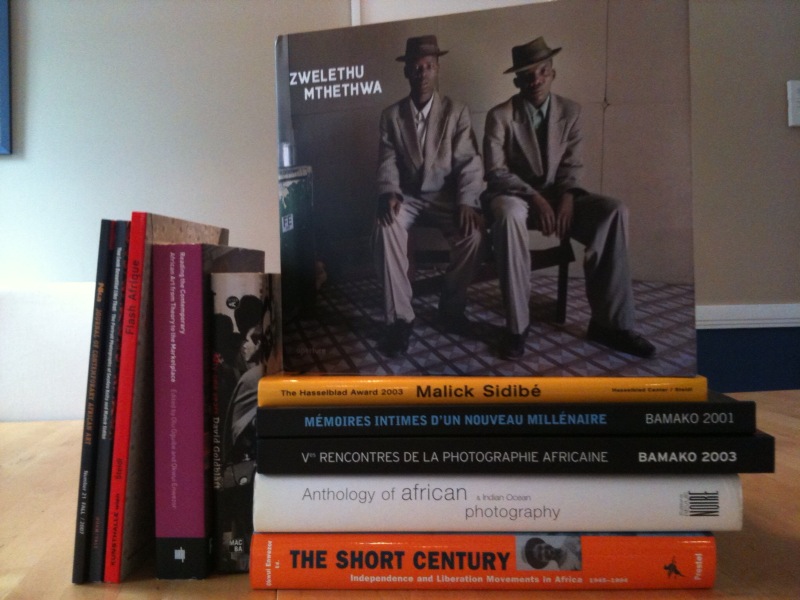March 26th, 2010

a selection of books on African photographers/photography
I just received my review copy of Zwelethu Mthethwa’s monograph published by Aperture. So excited! This is his first monograph and a monograph I have been waiting for for years. Joerg Colberg recently reviewed the book on his blog Conscientious and my review will be published by photo-eye. Colberg, or anyone for that matter, should definitely not be looking at traditional media for guidance in learning about the nuances, diversity, vibrant culture, art, and photographic discourse of Africa. About the monograph he said, “I really hope that Zwelethu Mthethwa will not be the last book of its kind, showcasing photography done by African artists. We need to see more.” I agree, in the sense that we need more monographs. Where are monographs for Lolo Veleko and Philip Kwame Apagya for example.
My interest in contemporary African photography developed in graduate school. Okwui Enwezor is my favorite curator. Half of my photography collection is dedicated to African photographers and I have a wide range of books on African photography. In light of Colberg’s search and a recent #photohistory discussion on Twitter, I wanted to offer a partial list of books dedicated to African photography from my library – a good place to start for anyone interested in this history of photography.
Snap Judgments (ICP/Steidl, 2006)
Rencontres Bamako 1998, 2001, 2003, 2005, 2007, 2009
Anthology of African & Indian Ocean Photography (Revue Noire, 1998)
In/sight: African Photographers 1940 to the Present (Guggenheim Museum, 2003)
The Short Century (Prestel, 2001)
Flash Afrique! Photography from West Africa (Steidl, 2002)
You Look Beautiful Like That: The Portrait Photographs of Seydou Keita and Malick Sidibe (Harvard Art Museum, 2001)
Africa Inside (Noorderlicht, 2000)
Malick Sidibe: Photographs (Steidl/Hasselblad Center, 2004)
J.D. ‘Okhai Ojeikere Photographs (Scalo, 2000)
Fifty-One Years: David Goldblatt (Actar, 2001)
“Talk of the Town: Seydou Keita” by Manthia Diawara in Reading the Contemporary: African Art from Theory to the Marketplace (MIT Press, 1999)
Nka: Journal of Contemporary African Art
and of course Zwelethu Mthethwa (Aperture, 2010)
And you can read about James Pomerantz’s class on African Photography on his blog A Photo Student.
I would love to hear from anyone about this subject. Please get in touch if you are a photographer, curator, writer, scholar, etc. I am specifically interested in what material/photographers are out there from East Africa.
December 13th, 2009
Andy Adams of Flak Photo and Miki Johnson of RESOLVE have joined forces in beginning a crowd-sourced dialogue about the future of photobooks. They’ve asked, “What do you think photobooks will look like in 10 years? Will they be digital or physical? Open-source or proprietary? Will they be read on a Kindle or an iPhone? And what aesthetic innovations will have transformed them?” George Slade has weighed in; so has Elizabeth Avedon, Amy Stein and Darius Himes, and Jörg Colberg wants to see more “curated photo books.” Considering the nature of this discussion (crowd-sourced) and the people involved, the answer is simple – anyway we want them to look.
The book form is not going anywhere and the photobook “publishing” industry of today is ever expanding – limited edition artist books, print-on-demand, indie publishers, self-published books, and the gamut of small to large traditional publishers. (After all, what would replace books as the backdrop for countless expert TV interviews? Okay, sarcasm aside.)
When Words Without Pictures (another crowd-sourced discussion on the “directional shifts in photography”) came out last year in book format, it was offered as either a printed book or a downloadable PDF. While I saw the benefits of getting a digital version (easily searchable), I preferred the flip-able, tangible book and made the conscious choice of buying a traditional printed and bound book. As the title suggests though, there were no photographs and this is a discussion about photobooks.
I’ll approach this topic as a collector of photography and photography books. There are different reasons to love and collect photobooks – the photographer, the body of work, the design, the aesthetics, the new-book-smell, the object itself, etc. The photobook is a creative expression in its own right. Losing the book as object is losing a unique visual expression. Having an e-book on some sort of e-reader defeats part of the purpose and the reason for collecting. Just look at a photographer’s website if you are going to look at photographs on a digital platform photobook – unless, that is, if the digital format has furthered the photobook in ways that the traditional book cannot.
The digital format does prove beneficial when talking about out-of-print books or of photography work not available on the internet. I’m thankful for Martin Parr and Gerry Badger’s The Photobook: A History Volumes I and II so I can reference books not in my personal collection without spending the entire day at the Library of Congress. I’m also thankful for Errata Editions for resurrecting classics through their Books on Books series. And I like that Google is digitizing books. Putting aside the debate over copyright issues, being able to virtually flip through a hard-to-find book in order to do research, as a reference, or to assess if I want to buy it or not is extremely useful. If the choice is a digital version or nothing – I will choose the digital document and then eventually seek out the original hard copy.
So what will photobooks look like in ten years? I see more limited edition artist books, self-published and independent ventures, more photographer collaboration, and multi-media “books.” Maybe there will be a museum for photography books (different in nature than a library) and maybe someone will have come up with book materials that aren’t so delicate – no scuffing, no paper disintegration, no cracked binding, no pages pulling away from the spine. It would solve my neurosis of wanting to own a pristine copy and be able to enjoy it at the same time.
